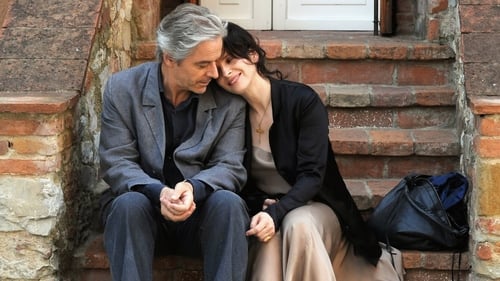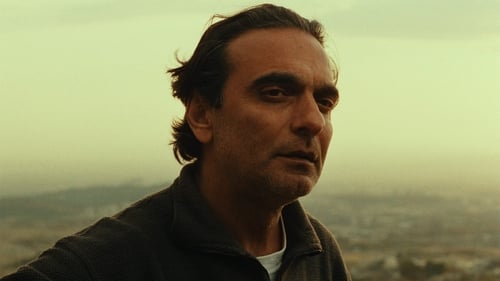Bahman Kiarostami
Nascimento : 1978-08-11, Tehran, Iran
História
Bahman Kiarostami is an Iranian documentary film director, cinematographer, editor and producer. He is the son of Abbas Kiarostami.

himself
Leeches a film by bahman kiarostami

Director
Leeches a film by bahman kiarostami

Director
A documentary about Iranian artist Parvaneh Etemadi

Writer
Since Iran opened its borders to refugees of the Soviet–Afghan War in 1979, it has become home to as many as 2.5 million Afghans, half of whom are undocumented. When renewed US sanctions in 2018 caused a currency collapse in Iran, the vulnerable population of migrants—often working as low-paid labourers in harsh conditions—was severely affected by the recession. Now, large numbers of them want to return home. Bahman Kiarostami (the son of late acclaimed director Abbas Kiarostami) sets up his camera in a Tehran-based facility processing thousands of illegals leaving the country. The migrants are asked surprising personal questions about everything from religion to drugs to family issues. With a Wiseman-esque fly-on-the-wall observation of these surprising interrogation sessions, Kiarostami paints a kaleidoscopic, empathetic and often humorous picture of the Afghans' place in Iranian society and their reasons for leaving it.

Editor
Since Iran opened its borders to refugees of the Soviet–Afghan War in 1979, it has become home to as many as 2.5 million Afghans, half of whom are undocumented. When renewed US sanctions in 2018 caused a currency collapse in Iran, the vulnerable population of migrants—often working as low-paid labourers in harsh conditions—was severely affected by the recession. Now, large numbers of them want to return home. Bahman Kiarostami (the son of late acclaimed director Abbas Kiarostami) sets up his camera in a Tehran-based facility processing thousands of illegals leaving the country. The migrants are asked surprising personal questions about everything from religion to drugs to family issues. With a Wiseman-esque fly-on-the-wall observation of these surprising interrogation sessions, Kiarostami paints a kaleidoscopic, empathetic and often humorous picture of the Afghans' place in Iranian society and their reasons for leaving it.

Producer
Since Iran opened its borders to refugees of the Soviet–Afghan War in 1979, it has become home to as many as 2.5 million Afghans, half of whom are undocumented. When renewed US sanctions in 2018 caused a currency collapse in Iran, the vulnerable population of migrants—often working as low-paid labourers in harsh conditions—was severely affected by the recession. Now, large numbers of them want to return home. Bahman Kiarostami (the son of late acclaimed director Abbas Kiarostami) sets up his camera in a Tehran-based facility processing thousands of illegals leaving the country. The migrants are asked surprising personal questions about everything from religion to drugs to family issues. With a Wiseman-esque fly-on-the-wall observation of these surprising interrogation sessions, Kiarostami paints a kaleidoscopic, empathetic and often humorous picture of the Afghans' place in Iranian society and their reasons for leaving it.

Director
Since Iran opened its borders to refugees of the Soviet–Afghan War in 1979, it has become home to as many as 2.5 million Afghans, half of whom are undocumented. When renewed US sanctions in 2018 caused a currency collapse in Iran, the vulnerable population of migrants—often working as low-paid labourers in harsh conditions—was severely affected by the recession. Now, large numbers of them want to return home. Bahman Kiarostami (the son of late acclaimed director Abbas Kiarostami) sets up his camera in a Tehran-based facility processing thousands of illegals leaving the country. The migrants are asked surprising personal questions about everything from religion to drugs to family issues. With a Wiseman-esque fly-on-the-wall observation of these surprising interrogation sessions, Kiarostami paints a kaleidoscopic, empathetic and often humorous picture of the Afghans' place in Iranian society and their reasons for leaving it.

Director
This documentary looks at the life and work of Iranian artist Monir Shahroudy Farmanfarmaian, who first garnered attention in the 1970s when she pioneered contemporary forms of geometric mirror works. Monir created an artistic language that was informed by traditional Iranian craft and architecture; formative years spent in New York in the 1940s and 50s and ongoing conversations with some of the 20th century's most experimental artists were also part of Monir's artistic universe. The film takes an intimate look at the artist's life and her practice, and explores how she has become one of the most innovative and influential artists working in the Middle East today. From her method of constructing mirror mosaics, to uncovering her past following the political changes in her own country and her subsequent migration to New York, and an artistic renewal sparked by her return to Tehran after an absence of 25 years, it offers an inspiring chronicle of Monir at the peak of her career.

Editor
Akiko é uma jovem que sai do interior do Japão para estudar em Tóquio, e que para sobreviver na cidade grande tem uma vida dupla: hora é uma universitária e namorada do mecânico Noriaki; hora é uma prostituta de uma agência que envia jovens para a casa dos clientes. Numa noite em que Akiko precisa fugir ao mesmo tempo do trabalho e do namorado para ver a avó seu chefe é duro e a manda para a casa de um cliente especial.

Cinematography
This movie is a documentary about Parviz Yahaghi, one of the most famous composers and musicians in Iran, who became isolated after the revolution due to the conditions in Iran. Born in 1935, Parviz Yahaghi, was a regular on the radio show 'Golha' from a young age. Several pre-revolutionary singers such as Mahasti, Homeira and Marzieh became famous for his songs, and with the sound of his violin, many fell in love with Iranian music. He became isolated after the victory of the revolution, although his music was never isolated. Parviz Yahaghi died in February of 2007. The film looks at his life in his own words and in the last years of his life.

Editor
Um escritor inglês está na Itália lançando seu mais novo trabalho sobre História da Arte, um livro onde defende que as cópias de obras artísticas possuem tanto valor quanto a original. Elle, dona de uma galeria, fica interessada em conversar mais com o autor e o convida para um café. Na conversa os dois vão discutir o argumento do livro, e após a dona da cafeteria confundi-los com um casal, irão, de certa forma, colocar a tese do livro em prática.

Editor
Persian Carpet is an omnibus film produced by Iran's National Carpet Center and Farabi Cinema Foundation where 15 renowned Iranian directors contributed films on the subject of Persian carpet. Carpets are the reflection of the cultural and historical identity of Iran.

Editor
Documentary about the 2002 murder of Iranian football star Nasser Mohammad Khani's wife, the subsequent confession to the crime by his mistress Shahla and her fight to escape the death sentence. (Storyville)

Editor
The documentary "Iran in Announcements", a research documentary about announcements in Iran, is from the early years of the announcement of Iran to the arrival of the Islamic Revolution.

Editor
This documentary looks at different aspects of the life of Bahman Farmanara, the well known Iranian film director and producer.

Cinematography
This documentary looks at different aspects of the life of Bahman Farmanara, the well known Iranian film director and producer.

Director
This documentary looks at different aspects of the life of Bahman Farmanara, the well known Iranian film director and producer.

Director
After Saddam Hussein's removal from power, Iranians rushed to cross the unguarded border with Iraq to visit the shrines of Shi'ism in Karbala and Najaf.

Editor
A documentary dealing with the life of Ahmadreza Ahmadi, an Iranian Poet.

Director
Twenty years after The Traveler was made, Kiarostami's son filmed his father as he reunited with the film's child star, now in his 30s.

Director
Persian Garden, gives a behind-the-scenes look at the largest and most ambitious art exhibition in Iran since the 1979 Islamic revolution.

Editor
Part 3 of documentary trilogy about Pertsian poet Forough Farrokhzad. This part focuses on her theatre and film work.

Director
Bahman Kiarostami's charming documentary about mourners-for-hire who are called upon to attend funerals in Iran. With an understated, lighthearted style, Tabaki provides a fascinating view of a peculiar occupation within this religious culture, offering, in the process, an insightful portrait of the society as a whole.

Second Assistant Director
Badii é um homem de boa condição financeira que decide suicidar-se. Planeja tomar vários remédios e deitar num buraco que cavou na montanha. Preocupado com o que pode acontecer a seu corpo, e pensando na possibilidade de o suicídio falhar, Badii começa a procurar entre trabalhadores pobres alguém confiável para ajudá-lo.

Director

Director
A thirty-nine minute sketch film for TASTE OF CHERRY that Abbas Kiarostani made with his son Bahman Kiarostami.

Producer
It was not a ship, Raphael was a city floating on water, a strange and shameful city, where did he come from? Raphael is a very beautiful ship that was bought from Italy in the 50s. Many Italians were sorry for selling it to Iran and were exposed to selling this cultural heritage of theirs. Raphael experienced the revolution and then the war. Where is Raphael now?

Director
It was not a ship, Raphael was a city floating on water, a strange and shameful city, where did he come from? Raphael is a very beautiful ship that was bought from Italy in the 50s. Many Italians were sorry for selling it to Iran and were exposed to selling this cultural heritage of theirs. Raphael experienced the revolution and then the war. Where is Raphael now?

Producer
"Lowland" is the result of 5 years, daily communication with those who lived on the outskirts of Tehran, Saeed's dumpsite, and collected recyclable garbages of Tehran.

Editor
"Lowland" is the result of 5 years, daily communication with those who lived on the outskirts of Tehran, Saeed's dumpsite, and collected recyclable garbages of Tehran.

Editor
Infidels (Koffar) is a film about the Godars—artist-Gypsies living in Northern Iran. The film recounts the four ways which the Godars make their living: dancing, acting, hunting and music, and showcases their dedication to preserve their art and age-old rituals. In this film the Godars sing songs, play music, and tell the ancient tales of their heritage which often deal with their problems with God.

Director

Editor

Director

Director
Kamancheh seeks to celebrate and preserve the unique and beautiful music of the kamancheh. It explores the lives, work, and aspirations of Iranian musicians who have devoted themselves to this distinctive and challenging instrument.

Director
Infidels (Koffar) is a film about the Godars—artist-Gypsies living in Northern Iran. The film recounts the four ways which the Godars make their living: dancing, acting, hunting and music, and showcases their dedication to preserve their art and age-old rituals. In this film the Godars sing songs, play music, and tell the ancient tales of their heritage which often deal with their problems with God.



























